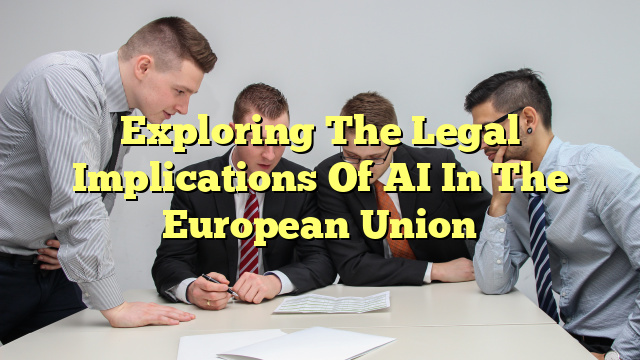Table of Contents
- Introduction
- EU Laws for AI
- Legal Implications of AI
- Why the EU is Regulating AI
- EU Legislative Proposal on AI
- Conclusion
Introduction
The European Union (EU) is beginning to shape its legal framework to better regulate artificial intelligence (AI). This legal framework will be comprised of multiple pieces of legislation that will need to work together to ensure that the EU is capable of regulating AI in a manner that is efficient, equitable, and ethical. This article will explore the various sources of EU law that will be involved in the legal regulation of AI, the legal implications of the use of AI, why the EU is regulating AI, and the EU legislative proposal on AI.
EU Laws for AI
The EU’s legal framework for AI is comprised of numerous pieces of legislation, both existing and proposed, including the following: the General Data Protection Regulation (GDPR); the Regulation on the European Agency for Artificial Intelligence (EAAI); the Regulation on Accessibility Requirements for Public Sector Bodies’ Websites and Mobile Applications; the Directive on Copyright in the Digital Single Market; and the Directive on the Legal Use of Artificial Intelligence (AI Directive).
The GDPR is the main source of law for data privacy and protection in the EU. It applies to any organization processing data of EU citizens. It requires organizations to adhere to specific standards for data security, data protection, and transparency when processing data of EU citizens.
The EAAI will be responsible for overseeing the development and use of AI in the EU. It will work to ensure that AI is used responsibly, ethically, and in accordance with EU law. It will also work to create a safe environment for the development and use of AI technologies in the EU.
The Regulation on Accessibility Requirements for Public Sector Bodies’ Websites and Mobile Applications will require public sector bodies to make their websites and mobile applications accessible to persons with disabilities. This is intended to ensure that disabled persons can have access to the services that they need, regardless of their disability.
The Directive on Copyright in the Digital Single Market will extend the scope of copyright protection to digital works. This will ensure that digital works, such as computer software, are adequately protected from unauthorized use and exploitation.
The AI Directive will be the main source of law for regulating the use of AI in the EU. It will set out the legal requirements for the development and use of AI technologies, as well as the obligations of organizations that use AI. It will also provide for criminal penalties for organizations that fail to comply with the legal requirements.
Legal Implications of AI
The use of AI can have a number of legal implications. For example, AI technologies can be used to make decisions that have legal consequences. This could include decisions about whom to hire or fire, who should receive a loan, or who should be granted asylum. Such decisions can have profound and far-reaching legal implications, and the EU is taking steps to ensure that these decisions are made in accordance with the law.
In addition, the use of AI can potentially lead to discrimination and other violations of fundamental rights. For example, AI technologies can be used to categorize people according to certain characteristics, such as race or gender. This can lead to discrimination if the technology is not used responsibly. It is therefore essential that the use of AI technologies is regulated in order to ensure that fundamental rights are not violated.
Why the EU is Regulating AI
The EU is regulating AI for a number of reasons. Firstly, the EU wants to ensure that AI technologies are used responsibly and ethically. This will ensure that the use of AI does not lead to abuse or exploitation of vulnerable individuals or groups.
Secondly, the EU wants to ensure that AI technologies are used in a manner that is compliant with EU law. The EU is concerned that the use of AI could potentially lead to violations of established laws, such as those relating to data protection and privacy,

